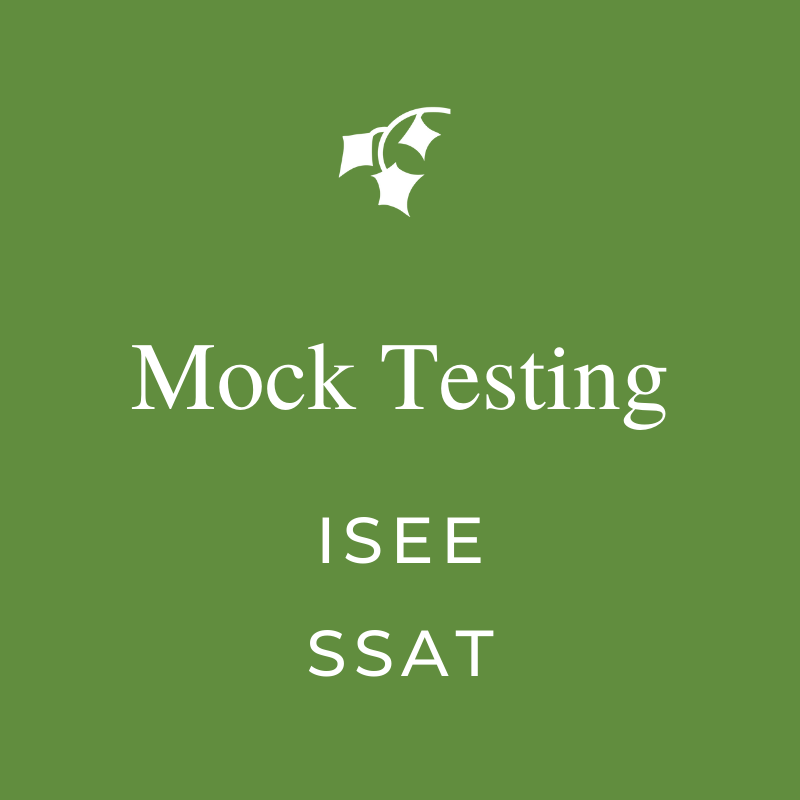
ISEE, SSAT, SHSAT PREPARATION
The ISEE and SSAT are multi-part admissions exams used by many private/boarding schools to determine the competitiveness of a candidate. ISEE and SSAT scores are typically a key deciding factor in the admissions process.
Both the ISEE and SSAT are administered on different levels for entry to elementary, middle, and high schools. Students are tested on quantitative reasoning, mathematics, verbal reasoning, reading comprehension, and essay writing. The multiple-choice exams are much more difficult than typical achievement tests that students encounter in school. For many students, strong academic performance does not correlate with strong ISEE or SSAT scores, and learning and developing test-taking skills are essential to performing well on the ISEE and SSAT. The best way to determine your student’s baseline is to take a diagnostic test.
The Specialized High Schools Admissions Test (SHSAT) is a multi-part admissions exam required to enroll in one of New York City’s specialized high schools. This exam is very similar to the SSAT, though with a higher level of difficulty. Most Ivy Link students prepare for the SHSAT in tandem with the SSAT or ISEE, depending on their target schools.
Unlike in a classroom setting, where students are subject to a rigid curriculum and other students' learning pace, our one-on-one tutoring program is customized to meet your student's ability level, learning style, and available studying time. We believe that each student's test preparation requirements are distinct.
CONTENT OF PROGRAM
We begin with a diagnostic test that assesses a student’s baseline scores, as well strengths and weaknesses. We then develop a strategic plan to prepare the student for the exam.
Initially, our tutoring focuses on the academic content of the exam, with close attention to how often-tested topics corresponds to the student’s coursework at school. Tutors teach and review math concepts and problem solving skills, critical reading methods, verbal reasoning skills, approaches to learning vocabulary, and essay writing skills. As the program progresses, tutors turn to specific test-taking strategies and tricks, especially for multiple-choice questions. Your student will be assigned drills and homework on a regular basis and tailored to his/her goal and aptitude, and parents will receive regular updates and advice on their student’s progress.
After learning the exam topics and test-taking strategies, your student will apply their knowledge and test-taking skills through multiple simulated practice tests offered remotely or at Ivy Link offices. We strongly believe that test-taking is a skill that can be developed with patience and through repeated practice.
LENGTH OF PROGRAM
Students typically start preparing for the ISEE, SSAT, or SHSAT several months before they intend to take the official test. Many students who plan to take the exams in the Fall term will start preparing during the prior Summer; weak test-takers sometimes start in the Spring.
We recommend that all students begin by taking a diagnostic test to determine their strengths and weaknesses. Diagnostic test results and other considerations allow us to design an appropriate program for the individual student.
SAT & ACT TEST PREP
After grades, the SAT or ACT is the single most important piece of one’s college application. Almost all applicants to competitive colleges engage in some type of preparation, but not all preparation is equal.
LENGTH OF PROGRAM
While the length of the program varies widely depending on the student’s starting point, goals and time commitments, most programs range from 5-10 months. This length really is just an average. Some students complete condensed programs over the summer and others need to spread the process out over a year or more. We work with the student and family to determine what is best in their unique situation. While Sat and ACT preparation can seem like an overwhelmingly daunting task, by planning early and creating a customized schedule we can help students reduce their stress and anxiety.
We strongly recommend completing the assessment by the end of 10th grade, but can tailor our program to students at any point in the process.
ASSESSMENT
To avoid the many common pitfalls and tailor students’ preparation programs to their unique needs, all Ivy Link students begin their SAT/ACT prep with an assessment. During this assessment, the student will take an SAT and ACT and their parents will receive a detailed report. Parents will then have the opportunity to discuss these results with our Director of Standardized Testing. Through these tests and meetings, we look at the student’s goals, concerns, strengths and weaknesses, learning style and commitments (both in and out of school, including during the summer) and determine:
When students should begin test preparation
What type and roughly how much preparation will be required
Preliminary schedule of when to take real standardized tests
Whether the SAT or the ACT is a better fit
How to best customize a curriculum for the student
TUTORING
When the time is right to begin preparation, the student will be matched with a tutor who best fits the child’s personality and learning style. Since a plan for the preparation will already be in place and the tutor will already have a sense of the student’s learning style, the student will hit the ground running.
LESSON PHASE
While each student’s program is different, most students spend the first 1-3 months receiving lessons on substantive material he or she doesn’t know. While the material covered might seem dry, our tutors’ innovated styles bring it to life and keep students engaged.
Additionally, our program breaks material down into small, very manageable pieces that students are able to master quickly. Students leave each session feeling as that they have mastered new material. In addition to helping them learn the materials for the SAT/ACT, this constant sense of accomplishment often results in increased self-confidence.
During this period, students typically meet with their tutors for 90 minutes/week and receive 2-3 hours of additional homework.
TESTING PHASE
After the student has covered about 75% of the substantive material on the exam, preparation begins to shift into the testing phase. Just as one preparing to play basketball must both drill and play scrimmages, a student preparing for the SAT or ACT must complete full-length tests. It is the only way to build stamina, reduce anxiety and prepare the student for what he/she will face on test day. Therefore, the student will take a personally-calibrated number of full length proctored exams (generally 1-3/month). These tests can be taken in person (when permissible) or remotely through our distance learning platform.
During his or her weekly tutoring sessions (which generally continue to be 90 minutes/week), in addition to reviewing and learning more substantive material, the student will begin honing his or her test taking skills. The tutor will help the student create a personally crafted test strategy, including how to handle careless mistakes, testing anxiety, timing and which questions to skip, among many other things.
Most of our students take at least 10 full-length proctored practice tests before taking the real SAT or ACT. They then usually take another 4 tests before taking the exam for the second time.

Test Prep Success Stories
ACT SUCCESSES
A Perfect Score. Claudette was a strong student and scored 26 on her diagnostic test in February of 10th grade. Claudette worked with her Ivy Link tutor 1.5 hours per week from February of 10th grade through October of 11th grade (including through the summer). Claudette took 14 practice tests before she took the official ACT in October of 11th grade. Claudette scored a 34 on her first attempt at the ACT. She then met with her tutor 1 hour per week for two more months and took 3 more practice tests. Claudette scored a 35 on the December ACT (with a super score of 36).
Academically Mediocre Student Achieved 9-Point Improvement. Through 9th and 10th grade, Albert was getting mostly B’s in his classes. Albert’s parents were worried about his ability to do well on standardized tests and wanted Albert to begin test preparation on the early side. Albert took a diagnostic ACT in February of 10th grade and received a 24. Albert began working with Ivy Link 1.5 hours per week and studied with his tutor from March of 10th grade through February of 11th grade (including over the summer). Albert also took 12 practice tests. He was able to raise his score to 33 on the February ACT during 11th grade.
Late Start, Good Finish. Coming from the UK, Ian’s family was not familiar with US college testing requirements and therefore started the process somewhat late. Ian took a diagnostic ACT late in the Fall of 11th grade and scored 22. Ian worked with a tutor for only 4 months for 3 hours each week and took 9 practice tests. He scored 31 on his real ACT in April of 11th grade. Ian had extracurricular and other commitments that prevented him from additional preparation and taking the ACT a second time.
SAT SUCCESSES
From 1390 to 1550. Nick had done some SAT preparation on his own and with another test prep company but was unable to achieve the score he wanted. In January of 11th grade, Nick scored 710 in verbal and 680 in math on his diagnostic SAT. Nick worked with an Ivy Link tutor weekly for 2 months (from mid-January to mid-March) and took 6 practice SATs. On his actual SAT, Nick’s scores improved to 730 in verbal and 780 in math. After a break from SAT preparation to focus on school, Nick resumed his SAT preparation over the summer before 12th grade. After intense preparation, which included 6 more weeks, 7 more practice tests, and lots of homework and drills, Nick retook the SAT in August (before 12th grade) and scored 760 in verbal and 790 in math.
Overcoming Anxiety to Achieve 310-Point Improvement. Marilyn was an above-average student in school but had always struggled with standardized testing, especially multi-choice format and time pressure. Moreover, Marilyn was not certain if the SAT or ACT would be more suitable for her. She scored an abysmal 18 on her diagnostic ACT (which is equal to a 980 on the SAT). Ivy Link devised a tutoring plan that initially covered topics on both the SAT and ACT so that Marilyn would have time to test the waters and decide. Marilyn worked with an Ivy Link tutor from the summer before 11th grade through May of 11th grade. In consultation with Ivy Link, Marilyn decided that she would more likely perform better on the SAT given her struggle with timed testing. After taking 9 practice SATs, Marilyn scored a 1290 (680 verbal and 610 math) on the real SAT in May of 11th grade.

AP EXAM PREPARATION
For many high school students, Advanced Placement (AP) exams pose a challenging year-end hurdle. These tests are a culmination of everything they learned during their AP courses, and come with high stakes. Students receive a score from 1 to 5, and high scores often allow them to receive credit for or exemption from introductory and elective courses at many universities.
TUTORING SERVICES
Students preparing for their AP exams begin working one-on-one with their tutor as early as January of the spring semester. Our tutors are well-versed in the material, having taken and excelled at these same tests, and are often experts in the field.
AP tutoring with Ivy Link largely follows the school’s curriculum to highlight the appropriate content; however, our tutors also utilize additional supplemental material that has been put together by Ivy Link to fill in any necessary gaps.
Students will learn how to tackle both the multiple choice and the free response sections of their exams. During their preparation, a student will take 2-3 full-length practice exams.
SUBJECTS OFFERED
English
AP English Language and Composition
AP English Literature and Composition
History and Social Sciences
AP European History
AP U.S. Government and Politics
AP U.S. History
Math and Computer Science
AP Calculus AB and BC
AP Precalculus
AP Statistics
Sciences
AP Biology
AP Chemistry
AP Physics 1 and 2 (Algebra-based)
AP Physics C: Electricity and Magnetism
World Languages and Cultures
AP Chinese Language and Culture
AP French Language and Culture
AP Latin
AP Spanish Language and Culture
AP Spanish Literature and Culture

Empowering your student’s academic potential doesn’t need to be stressful.
We’re happy to answer your questions…



